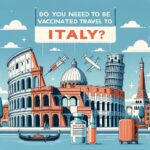Are you wondering, “Can I travel to Italy if I am fully vaccinated“? As the world gradually adjusts to the new norms brought about by the global pandemic, travel restrictions continue to evolve. In this article, we will explore the current entry requirements for fully vaccinated individuals traveling to Italy.
With international travel gradually resuming, being fully vaccinated has become an important factor in easing entry into many countries, including Italy. As such, understanding the specific requirements and protocols for vaccinated travelers is crucial for anyone planning a trip to this popular European destination.
Italy’s entry requirements for vaccinated travelers have been subject to updates and changes in response to the ongoing pandemic. From documentation and proof of vaccination to potential restrictions within the country, it’s essential for fully vaccinated individuals to be well-informed before embarking on their Italian adventure. Let’s delve into the details of Italy’s entry requirements and what fully vaccinated travelers need to know before heading to this picturesque destination.
Italy’s Entry Requirements
Overview of Entry Requirements
Italy has recently updated its entry requirements for vaccinated travelers, allowing those who are fully vaccinated to enter the country for tourism purposes. This is great news for individuals who have been eagerly awaiting the opportunity to explore Italy’s rich culture and breathtaking landscapes. However, it’s important to understand the specific measures and documentation needed to comply with Italy’s entry requirements.
Documentation and Proof of Vaccination
In order to travel to Italy as a fully vaccinated individual, visitors must present a valid vaccination certificate that includes details of their completed vaccine doses. Accepted vaccines include those authorized by the European Medicines Agency (EMA) or listed by the World Health Organization (WHO). Additionally, travelers will need to complete a Passenger Locator Form before entering Italy and may be subject to health screenings upon arrival.
Specific Vaccines Accepted and Booster Shot Requirements
While Italy accepts a wide range of vaccines for entry, it’s important for travelers to verify that their specific vaccine is approved by Italian authorities. Additionally, there may be further guidelines regarding booster shot requirements or additional vaccinations needed in certain circumstances. It’s essential for travelers to stay up-to-date with any changes in vaccine requirements prior to their trip.
These entry requirements are designed to ensure the safety and well-being of both visitors and residents in Italy, allowing vaccinated individuals to enjoy everything this beautiful country has to offer while minimizing public health risks. With proper planning and adherence to these guidelines, fully vaccinated individuals can look forward to a memorable and safe travel experience in Italy.
Vaccination Requirements
Fully vaccinated individuals can travel to Italy, with the country now allowing entry for tourists who have completed their COVID-19 vaccination. To enter Italy, travelers must have received a vaccine authorized by the European Medicines Agency (EMA) or equivalent entities in other countries. These vaccines include Pfizer-BioNTech, Moderna, AstraZeneca, and Johnson & Johnson. Additionally, individuals must have completed the full vaccination course at least 14 days before their arrival in Italy.
It is important for fully vaccinated travelers to provide proof of their vaccination status upon arrival in Italy. This can be done by presenting a digital COVID-19 certificate or a physical copy of the vaccination certificate. The certificate should contain specific details regarding the individual’s vaccination history, including the type of vaccine received, dates of each dose, and personal information matching their passport or identification.
There are currently no specific booster shot requirements for entering Italy as a fully vaccinated traveler. However, it is advisable for individuals to stay informed about any updates or changes to the country’s entry requirements, especially regarding booster shots. It is also essential for travelers to review and comply with any additional health and safety measures implemented by Italian authorities during their visit.
Travel Restrictions Within Italy
Italy has implemented specific travel restrictions and requirements for individuals traveling within the country, especially in light of the ongoing COVID-19 pandemic. Even if you are fully vaccinated, it is important to understand and adhere to these regulations to ensure a smooth and enjoyable trip.
When traveling within Italy, fully vaccinated individuals
- Do not need to quarantine upon arrival
- Are not required to undergo additional testing
- Must still comply with any local health and safety protocols, including mask mandates and social distancing measures
It’s important for travelers to stay updated on any changes to these restrictions, as the situation may evolve based on the current public health landscape. Additionally, different regions within Italy may have varying protocols in place, so it’s advisable to research the specific destination(s) you plan to visit.
As of now, travelers who are fully vaccinated can enjoy greater flexibility when exploring Italy without being subject to stringent quarantine measures or testing requirements. This allows for a more seamless and enjoyable travel experience while still prioritizing public health and safety.
Safety Protocols
Italy has put in place a set of health and safety protocols to ensure the well-being of both its residents and visitors. These protocols include mask mandates in indoor spaces, as well as on public transportation, and the practice of social distancing in crowded areas.
It is important for travelers to remain vigilant and adhere to these guidelines in order to contribute to the overall safety of the country. Additionally, it is essential for fully vaccinated individuals to keep their proof of vaccination readily available at all times, as they may be required to present it upon entry into certain establishments or attractions.
In terms of specific safety measures, Italy has also implemented testing protocols for travelers arriving from certain countries with higher rates of COVID-19 transmission. Upon arrival, fully vaccinated travelers may still be subject to random testing, so it is crucial to be prepared for this possibility. While quarantine measures are not currently mandatory for vaccinated travelers entering Italy, it is advisable to stay updated on any new developments or changes in regulations.
As an added precaution, travelers can also take advantage of outdoor dining options and choose less crowded times to visit popular attractions. By staying informed about Italy’s health and safety protocols and following them accordingly, fully vaccinated individuals can enjoy their travels while minimizing risks related to the ongoing pandemic.
| Health and Safety Protocols | Italy’s Current Health and Safety Protocols Include Mandatory Mask-Wearing in Indoor Spaces and on Public Transportation. |
|---|---|
| Testing Protocols | Italy has implemented testing protocols for certain travelers arriving from countries with higher rates of COVID-19 transmission. |
| Quarantine Measures | While quarantine measures are not mandatory for vaccinated travelers entering Italy, it is important to stay updated on any changes in regulations. |
Must-See Destinations in Italy
Italy is a country known for its rich history, stunning architecture, and exquisite cuisine. For fully vaccinated travelers, there are countless must-see destinations to explore within Italy. From iconic landmarks to hidden gems, the country offers a diverse range of experiences for visitors.
Popular Destinations
Italy is home to several world-renowned cities and attractions that should be at the top of any traveler’s list. The ancient city of Rome, with its iconic Colosseum and Vatican City, is a must-visit for history enthusiasts. The romantic canals of Venice provide a unique and picturesque setting for exploration. Meanwhile, Florence boasts an abundance of Renaissance art and architecture, including the famous Duomo and Uffizi Gallery.
Lesser-Known Gems
In addition to the well-known hotspots, Italy is also home to lesser-known destinations that offer a more authentic and off-the-beaten-path experience. The Amalfi Coast, with its stunning seaside villages and dramatic cliffs, is a hidden gem that showcases the natural beauty of southern Italy. The charming town of Siena in Tuscany offers a glimpse into medieval Italy with its preserved historic center and annual Palio horse race.
Vaccination Requirements for Attractions
When planning a trip to Italy, fully vaccinated individuals should be aware that some attractions may have specific entry requirements for vaccinated visitors. It’s important to research and verify if popular landmarks or cultural sites require proof of vaccination for entry. Additionally, certain museums or galleries may have capacity limits or timed entry reservations as part of their COVID-19 safety protocols.
For those wondering “Can I travel to Italy if I am fully vaccinated,” understanding the must-see destinations in Italy can make the decision even more enticing. Whether it’s exploring famous historical landmarks or discovering hidden treasures off the beaten path, Italy offers something special for every fully vaccinated traveler.
Tips for Traveling to Italy
Italy is a popular travel destination known for its rich history, stunning architecture, and delicious cuisine. If you are fully vaccinated and wondering “Can I travel to Italy if I am fully vaccinated?” the good news is that Italy has opened its borders to vaccinated travelers. Here are some tips for traveling to Italy as a fully vaccinated individual:
- Ensure you have proof of vaccination: Before traveling to Italy, make sure you have your official vaccination certificate or card with you. This will be essential for meeting Italy’s entry requirements and may also be required when visiting certain attractions or venues.
- Stay updated on entry requirements: Keep an eye on Italy’s current entry requirements for vaccinated travelers. These may include filling out a health declaration form, providing proof of negative COVID-19 test results, or undergoing additional health screenings upon arrival.
- Research specific destinations: Different regions in Italy may have their own specific measures or guidelines for travelers. Before visiting a particular city or town, look into any local restrictions or safety protocols that may be in place.
As you plan your trip to Italy, it’s also important to consider practical aspects of travel such as booking accommodations and transportation. Here are some additional tips to keep in mind:
- Book accommodations in advance: Especially during peak tourist seasons, it’s wise to secure your lodging ahead of time to ensure availability and potentially snag some deals.
- Consider public transportation options: Italy has an efficient public transportation system, including trains and buses, which can be a convenient and cost-effective way to get around during your travels.
- Respect local customs and regulations: As a visitor in Italy, it’s essential to respect local customs and follow any regulations put in place for the safety and well-being of residents and fellow travelers.
By following these tips and staying informed about Italy’s travel requirements for vaccinated individuals, you can have a safe and enjoyable trip to this beautiful country. Buon viaggio.
Conclusion
In conclusion, the prospect of traveling to Italy if you are fully vaccinated is becoming increasingly promising as the country continues to update its entry requirements for vaccinated individuals. With the current travel restrictions in place and the importance of being fully vaccinated, Italy has established specific entry requirements for vaccinated travelers. This includes providing documentation and proof of vaccination as a key part of the entry process.
Italy’s acceptance of specific vaccines for entry and any potential booster shot requirements are essential factors to consider when planning a trip to Italy. Additionally, it is important to note any potential travel restrictions within Italy, such as quarantine measures or testing protocols that may be in place for travelers.
Despite these potential restrictions, it is reassuring that Italy has implemented health and safety protocols for travelers, including mask mandates and social distancing measures, adding another layer of protection for those visiting the country.
For those considering a trip to Italy, exploring the must-see destinations in the country is an exciting prospect. Many popular and lesser-known destinations are open to fully vaccinated travelers, offering a wealth of experiences to enjoy while exploring all that Italy has to offer.
As always, staying informed about any updates to Italy’s travel requirements for vaccinated individuals will be crucial as plans are made and trips are booked. It is advised that prospective visitors remain vigilant regarding their own health and safety while staying up-to-date with any changes in travel regulations.

I’m a passionate traveler, writer, and Italophile. My fascination with Italy’s history, art, and culture has led me on countless adventures across the Italian landscape. Through “I Live Italy,” I share my love for this extraordinary country and aims to inspire others to explore its boundless beauty.




